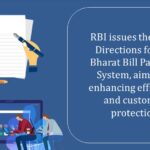In a Press Release dated 18th August, 2020 the Reserve Bank of India (“RBI”) has invited comments on the Draft Framework for recognition of a Self-Regulatory Organisation (“SRO”) for Payment System Operators (“PSOs”).
Comments must be emailed to RBI on or before 15th September, 2020.
Objectives:
1. The draft framework has been placed by RBI for grant of recognition to an industry association as a Self-Regulatory Organisation (SRO) for Payment System Operators.
2. The SRO will cover operations in all segments of payment systems and will be expected to observe best practices on security, customer protection and competitiveness.
3. Further, the SRO will serve as a two-way communication channel between the PSOs and Reserve Bank and work towards establishing minimum benchmarks and standards in the payments space, apart from helping disciplined behaviour by members.
[An SRO is a non-governmental organisation that sets and enforces rules and standards relating to the conduct of entities in the industry (members) with the aim of protecting the customer and promoting ethics, equality, and professionalism. SROs typically collaborate with all stakeholders in framing rules and regulations. Their self-regulatory processes are administered through impartial mechanisms such that members operate in a disciplined environment and accept penal actions by the SRO. An SRO is expected to address concerns beyond the narrow self-interests of the industry, such as to protect workers, customers or other participants in the ecosystem.]
The key proposals in the Draft Framework are mentioned below
1. Eligibility for recognition of an SRO by RBI:
a. An SRO will be set-up as a not-for-profit company under the Companies Act.
b. Any group or association of PSOs desirous of being recognised as an SRO by the Reserve Bank shall have as its members a majority of the industry segment it seeks to represent, in terms of number / volume / value.
c. The SRO will be professionally managed with clear bye laws.
d. The memorandum / bye laws of the SRO will specify criteria for admission of members and the functions it will discharge, as one of its main objects.
e. The memorandum / bye laws of the SRO will also provide for the manner in which the governing body of the SRO would function.
f. RBI reserves the right to clear the appointment of important positions in the governing body of the SRO.
g. The SRO will have adequate infrastructure to discharge its duties effectively, at the time of application.
2. General criteria:
a. The Board of Directors and management of the SRO must satisfy the fit and proper criteria prescribed by the Reserve Bank, on an ongoing basis. Any change in directorship or adverse development about any Director must be immediately reported to the Reserve Bank.
b. The SRO has to frame a code of conduct to be followed by all its members.
c. The SRO must be in a position to exercise surveillance over its members to ensure that the code of conduct prescribed by it and the regulatory prescriptions of the Reserve Bank are adhered to by its members.
3. Grant of recognition as an SRO:
a. Interested entities have to apply to the Reserve Bank seeking recognition as an SRO.
b. Reserve Bank reserves the right to require the entity to submit further information or clarification as deemed necessary by it before granting recognition as an SRO. On finding suitable as an SRO, the Reserve Bank must issue a letter of recognition.
c. Reserve Bank, if it considers appropriate, is not obligated to necessarily involve the recognised SRO in any discussions or decisions.
d. Reserve Bank may forward any proposals / suggestions to the recognised SRO for further engagement with its members.
e. Reserve Bank may withdraw its recognition to the SRO after giving due opportunity to the entity to further its views / comments.
4. The Draft Framework also provides for the functions and obligations of an SRO.
Source: Reserve Bank of India




